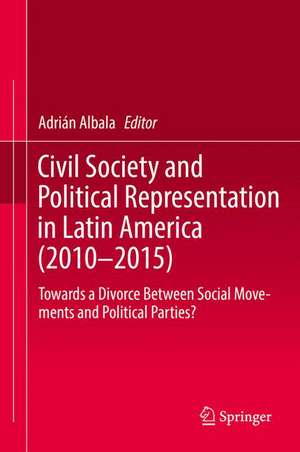Civil Society and Political Representation in Latin America (2010-2015): Towards a Divorce Between Social Movements and Political Parties?
Editat de Adrián Albalaen Limba Engleză Hardback – 17 noi 2017
The contributions gathered in this volume intend to show that the logic of political representation in Latin America and its supposed “crisis” is not a common and constant feature for all region. Some countries like Chile, Brazil, Colombia and Mexico seem to have experienced a process of autonomization of its social movements vis-à-vis its institutional political system. However, Argentina, Bolivia, Ecuador and Uruguay have not seen such a split between civil society and the political parties.
Bringing together eight case studies of the countries mentioned and a general assessment of the situation in the whole region, this book presents some interesting findings that will contribute to the discussions about the political representation crisis in Latin America, providing valuable resources for political leaders, researchers, policy makers and social activists in the region.| Toate formatele și edițiile | Preț | Express |
|---|---|---|
| Paperback (1) | 723.38 lei 43-57 zile | |
| Springer International Publishing – 23 mai 2018 | 723.38 lei 43-57 zile | |
| Hardback (1) | 729.36 lei 43-57 zile | |
| Springer International Publishing – 17 noi 2017 | 729.36 lei 43-57 zile |
Preț: 729.36 lei
Preț vechi: 889.47 lei
-18% Nou
Puncte Express: 1094
Preț estimativ în valută:
139.56€ • 146.11$ • 115.48£
139.56€ • 146.11$ • 115.48£
Carte tipărită la comandă
Livrare economică 07-21 aprilie
Preluare comenzi: 021 569.72.76
Specificații
ISBN-13: 9783319678009
ISBN-10: 3319678000
Pagini: 213
Ilustrații: X, 214 p. 5 illus., 2 illus. in color.
Dimensiuni: 155 x 235 mm
Greutate: 0.49 kg
Ediția:1st ed. 2018
Editura: Springer International Publishing
Colecția Springer
Locul publicării:Cham, Switzerland
ISBN-10: 3319678000
Pagini: 213
Ilustrații: X, 214 p. 5 illus., 2 illus. in color.
Dimensiuni: 155 x 235 mm
Greutate: 0.49 kg
Ediția:1st ed. 2018
Editura: Springer International Publishing
Colecția Springer
Locul publicării:Cham, Switzerland
Cuprins
Chapter 1 - Introduction: Political Parties and Social Movements in Latin America (2011-2016).- Part 1- The autonomization of civil society vis-a-vis political parties in Latin America.- Chapter 2- Representatives and Represented: Political Parties, Participation and the Brazilian Protests in 2013.- Chapter 3 - Institutionalization vs. Responsiveness: The dilemma of political representation in Chile.- Chapter 4 - Political Representation and Social Movements in Colombia 2002-2016.- Chapter 5 - Civil Society and Political Representation in Mexico.- Part 2: Cases with Movements strongly linked to parties.- Chapter 6 - Representation, Party System and Civil Society in Argentina (2003-2015).- Chapter 7 - Dilemmas o
f Contemporary Political Representation in Bolivia: Social Movements, Party and State in Plurinational Times.- Chapter 8 - Citizenship and political parties in Ecuador.- Chapter 9 - Participation and Representation in Uruguay: Challenges for Social Mobilization in a Party-Centered Society.- Chapter 10 - Conclusion: The support of political parties in Latin AmericaNotă biografică
Adrián Albala holds a PhD in Political Science from Sorbonne University, France, is a researcher at the Núcleo de Pesquisas de Políticas Públicas (NUPPs) of the University of São Paulo, Brazil, with a postdoctoral fellowship fom the São Paulo State Foundation for Science (FAPESP) and a visiting professor at the Federal University of ABC (UFABC), Brazil.
Textul de pe ultima copertă
This book presents in-depth analyses of the wave of political protest and unrest that spread throughout Latin America between 2010 and 2015 in order to answer a question that has been challenging social scientists all over the region: why some countries have faced a divorce between their social movements and political parties while others have not?
Bringing together eight case studies of the countries mentioned and a general assessment of the situation in the whole region, this book presents some interesting findings that will contribute to the discussions about the political representation crisis in Latin America, providing valuable resources for political leaders, researchers, policy makers and social activists in the region.The contributions gathered in this volume intend to show that the logic of political representation in Latin America and its supposed “crisis” is not a common and constant feature for all region. Some countries like Chile, Brazil, Colombia and Mexico seem to have experienced a process of autonomization of its social movements vis-à-vis its institutional political system. However, Argentina, Bolivia, Ecuador and Uruguay have not seen such a split between civil society and the political parties.
Caracteristici
Analyzes the wave of political protest and unrest that spread throughout Latin America between 2010 and 2015 Presents important findings in order to answer the question: why some countries have faced a divorce between their social movements and political parties while others have not? Brings together eight case studies of the situation in Brazil, Chile, Colombia, Mexico, Argentina, Bolivia, Ecuador and Uruguay
